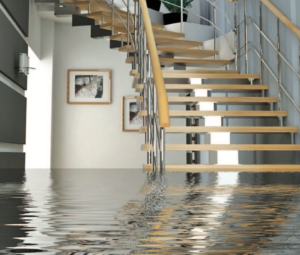Going down the steps to the dark basement in the middle of the night, only to have your toes submerge into a cold body of water when you reach the bottom of the stairs in one of every homeowner’s worst nightmares. And for many people, this nightmare becomes a reality at least once or twice in their lifetime. Often this can be cause by piping or sewer backup issues inside the home itself, but this can also come from outside.
Many homes exist in a government identified “flood plain” for which homeowners have to purchase special flood insurance. The typical property/casualty home insurance policy precludes water damage if the origin of the water it outside. This is why special flood insurance is necessary if a home is in a location where the likelihood of water coming from outside the house is high. This can often catch homeowners off-guard when they realize that the water damage caused inside a basement, the originally stemmed from a hose that was left on outside all night, will not be covered by their insurance, because they don’t have flood insurance. This is why it is imperative that one takes preventative measures to ensure a flood does not happen in the basement of one’s home.
Tend to your gutters. Gutters are a very common source of flood water that eventually gets into the house. First you’ll want to make sure that the end of the downspouts direct water at least several feet away from the house. Large amounts of water that come off the roof and poor directly into the soil next to the home can easily seep through cracks in the cement of basement walls as well as cause long term foundation issues. Also remember to slope your yard so that water moves away from the home once it has reached the ground instead of toward it. This seems common sense but you’d be surprised at home many homes actually have yards that slope toward the home. Also make sure to clean out gutters on the roof. If a gutter is full of leaves or other debris, water will be blocked from leaving through the downspout and will end up spilling over the sides, falling directly down to the side of the home.
Being observant is the number one weapon anyone has when hoping to prevent any type of situation. Look around your environment and see if you can spot potential hazards relevant to your concern about flooding. The next time there is heavy rainfall, walk around the perimeter of your home. Look for spots where water might be pooling and note if they are too close to the home for comfort or if they have a way to drain away from the house. If they down, it might be time to manipulate your landscaping in order to disburse water away from the house and mitigate pooling.
Last, it may be helpful to install a sump pump. This can act like a huge drain that will keep any flood that does happen in your basement from getting too deep. Of course if you do end up having a flood in your basement, give us a call. Our Emergency Water Extraction technicians are on call 24/7 and we pride ourselves in responding to emergency calls within our large service area in an hr our less.
